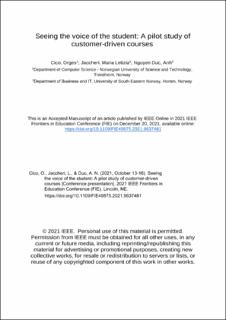| dc.contributor.author | Cico, Orges | |
| dc.contributor.author | Jaccheri, Maria Letizia | |
| dc.contributor.author | Nguyen Duc, Anh | |
| dc.date.accessioned | 2022-08-05T09:17:05Z | |
| dc.date.available | 2022-08-05T09:17:05Z | |
| dc.date.created | 2021-11-30T06:33:07Z | |
| dc.date.issued | 2021 | |
| dc.identifier.citation | Cico, O., Jaccheri, L., & Duc, A. N. (2021, October 13-16). Seeing the voice of the student: A pilot study of customer-driven courses [Conference presentation]. 2021 IEEE Frontiers in Education Conference (FIE). Lincoln, NE. | en_US |
| dc.identifier.issn | 1539-4565 | |
| dc.identifier.uri | https://hdl.handle.net/11250/3010299 | |
| dc.description.abstract | Context: Customer-driven courses have been a classic approach in teaching software engineering for over four decades at the Norwegian University of Science and Technology. The main goal of these courses is close collaboration between students and customers. However, in this scope of work, the intent was to evaluate students’ perception of skills acquisition, startup formation mindset, and the introduction of external activities. Objectives: Several aspects were investigated, which include how collaboration with external customers affects student skills in a customer-driven course, how collaboration with external customers affects students’ motivation in startup formation, and how students perceive the introduction of an external Innovation Bootcamp activity at the start of the course. Method: Twelve semi-structured focus group interviews were conducted with 86 students. Furthermore, an inductive thematic analysis was performed, which utilized open coding of the interview transcripts. Results: Students reflected an improvement in technical, soft, and project management skills. It was found that many of the customers’ projects were not eligible for becoming startups due to the nature of the project niche scope closely related to the customer needs. Motivations in startup formation rely heavily on individual students’ mindsets, and many of the teams had a weak perception about startup formation within the existing course context. The overall observation from the focus group interviews was that introducing external activities such as Innovation Bootcamp could assist in the process of startup formation and elevate the projects’ relevance and quality. Contribution: The study’s findings contribute to the course’s future improvement while introducing external activity. The outcome could promote student innovation and active participation in customer project proposals and end-product features. Educators and researchers can benefit from the findings of our study in regard to making future updates to their customer-driven courses. There is also potential to increase practitioners’ awareness of positive student input in their project proposals. | en_US |
| dc.language.iso | eng | en_US |
| dc.relation.uri | https://ieeexplore.ieee.org/xpl/conhome/1000297/all-proceedings | |
| dc.title | Seeing the voice of the student: A pilot study of customer-driven courses | en_US |
| dc.type | Peer reviewed | en_US |
| dc.type | Journal article | en_US |
| dc.description.version | acceptedVersion | en_US |
| dc.rights.holder | © 2021 IEEE. | en_US |
| dc.source.pagenumber | 8 | en_US |
| dc.source.journal | Conference Proceedings - Frontiers in Education Conference | en_US |
| dc.identifier.doi | https://doi.org/10.1109/FIE49875.2021.9637481 | |
| dc.identifier.cristin | 1961309 | |
| dc.relation.project | Norges forskningsråd: 274816 | en_US |
| cristin.ispublished | true | |
| cristin.fulltext | preprint | |
| cristin.qualitycode | 1 | |
